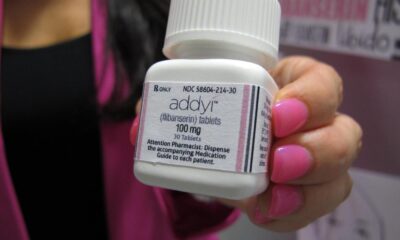Health
F.D.A. Withdraws Talc Asbestos Testing Rule, Health Advocates Alarmed

The U.S. Food and Drug Administration (F.D.A.) has officially withdrawn its proposed rule that would require testing cosmetics made with talc for the presence of asbestos. This decision, announced in early October 2023, has raised significant concerns among public health advocates who have been campaigning for stricter regulations to eliminate asbestos in consumer products.
The F.D.A. stated that it intends to develop a more comprehensive rule in the future. While the agency did not provide a specific timeline for when this new rule would be implemented, the withdrawal of the initial proposal has alarmed those who prioritize consumer safety. Asbestos is a known carcinogen, and its presence in talc-based products has been linked to serious health risks, including various forms of cancer.
Health advocates have expressed disappointment over the move, emphasizing that the initial requirement for testing would have provided a critical layer of protection for consumers. Many organizations have worked for years to ensure that products containing talc are thoroughly examined for asbestos contamination, which has been a persistent concern in the cosmetics industry.
The F.D.A.‘s decision comes amidst ongoing scrutiny of the safety of talc, especially in light of recent lawsuits against major companies that have faced allegations regarding the safety of their talc-based products. In some cases, juries have awarded substantial damages to plaintiffs who claimed that they developed cancer as a result of using these products.
As the regulatory landscape evolves, consumer advocacy groups will likely continue to press for transparency and safety in the cosmetics industry. They argue that the absence of mandatory testing for asbestos in talc products could leave consumers vulnerable to harmful exposure.
The F.D.A. has reiterated its commitment to consumer safety but acknowledges that crafting a more robust rule will take time. The agency’s approach to regulating talc-based cosmetics reflects a broader trend toward heightened scrutiny of ingredients in personal care products, particularly those that pose potential health risks.
While the agency plans to revisit the issue, consumer advocates are urging for immediate action to protect public health. They are calling for an expedited review process to ensure that the new regulations address the serious concerns surrounding asbestos in cosmetics.
This situation underscores the ongoing debate about the balance between industry interests and public health. As the F.D.A. re-evaluates its policies, the dialogue around consumer safety in cosmetics will continue to gain traction, particularly among those advocating for stricter oversight and testing protocols.
In summary, the withdrawal of the F.D.A.‘s rule on asbestos testing in talc cosmetics has sparked concern among health advocates. As efforts to ensure consumer safety evolve, the impact of this decision will likely reverberate throughout the cosmetics industry and among consumers looking for safer products.
-

 Technology5 months ago
Technology5 months agoDiscover the Top 10 Calorie Counting Apps of 2025
-

 Technology2 weeks ago
Technology2 weeks agoOpenAI to Implement Age Verification for ChatGPT by December 2025
-

 Health3 months ago
Health3 months agoBella Hadid Shares Health Update After Treatment for Lyme Disease
-

 Health3 months ago
Health3 months agoErin Bates Shares Recovery Update Following Sepsis Complications
-

 Health3 months ago
Health3 months agoAnalysts Project Stronger Growth for Apple’s iPhone 17 Lineup
-

 Technology4 months ago
Technology4 months agoDiscover How to Reverse Image Search Using ChatGPT Effortlessly
-

 Technology3 months ago
Technology3 months agoElectric Moto Influencer Surronster Arrested in Tijuana
-

 Technology2 months ago
Technology2 months agoDiscover 2025’s Top GPUs for Exceptional 4K Gaming Performance
-

 Technology5 months ago
Technology5 months agoMeta Initiates $60B AI Data Center Expansion, Starting in Ohio
-

 Technology5 months ago
Technology5 months agoRecovering a Suspended TikTok Account: A Step-by-Step Guide
-

 Health5 months ago
Health5 months agoTested: Rab Firewall Mountain Jacket Survives Harsh Conditions
-

 Lifestyle5 months ago
Lifestyle5 months agoBelton Family Reunites After Daughter Survives Hill Country Floods





















